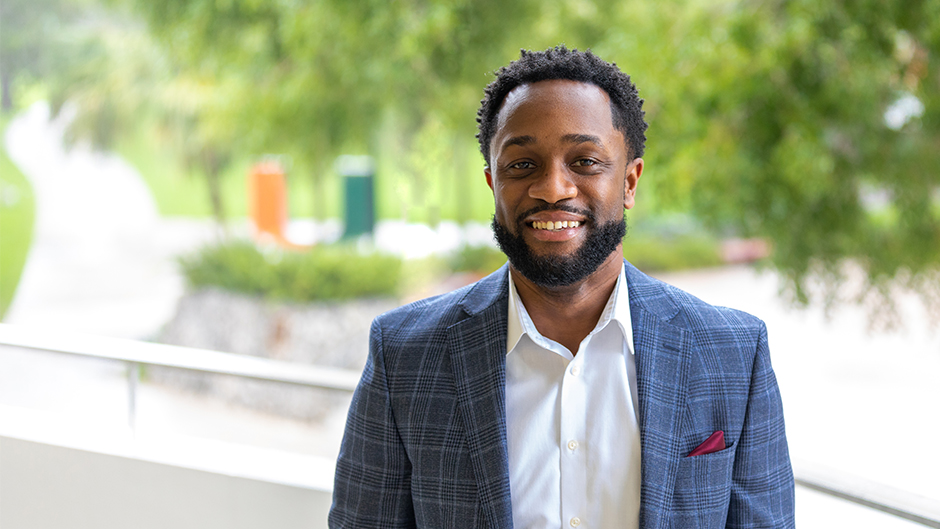Christopher Clarke, director of Multicultural Student Affairs (MSA), is living his dream by supporting University of Miami students on their path to graduation. A South Florida native, Clarke’s role at the University—which he has held for almost two years—involves providing services and programs that challenge, motivate, and support ethnically diverse students. Working closely with Kennedy Robinson, assistant director of MSA programs, the duo advises more than 20 student organizations, meeting regularly with undergraduate students on campus to manage, engage with, and mentor them.
“Our work impacts the ability of students to be their whole self in and out of the classroom,” said Clarke, who noted the importance of providing one-on-one conversations, professional development, workshops, advising, and mentorship opportunities. For Clarke, who initially wanted to pursue a career as an educator, his lived experiences and passion informed his chosen career path—one that led him to work in higher education and in a position that fosters social impact.
Throughout his career, Clarke learned to navigate the world of higher education and figured things out along the way. “Many students from historically underrepresented backgrounds have goals to attend college but lack resources to do so,” he said. “I wanted to make sure students from multicultural backgrounds could find, get into, and graduate from college and become employable.”
Recognizing that students have intersecting identities, Clarke explained that his role involves making sure students feel supported. “My goal is to align our office and goals to champion students and use this space to advance others,” he said. Most importantly, he is looking to measure impact and understand how his team’s work assists students in their college and postsecondary life. “If we’re successful, we can share our stories so others can learn and model the things that have worked here.”
As a high school graduate, Clarke moved to the midwest to attend Concordia University Wisconsin where he completed a double major in educational studies and justice and public policy with a minor in health education. But Clarke’s dream was to be back in his hometown working in his community. After serving as the inaugural director of diversity and inclusion at the University of Chicago Law School and working at the University of Michigan and the University of Illinois Chicago in similar capacities, he is back in the classroom pursuing his Doctor of Education in Higher Education Leadership at the University of Miami School of Education and Human Development.
“When I look outside of my window, I see the U statue and I still get goosebumps,” Clarke admitted. “It’s stressful, challenging work, but my cup is full because it’s everything I wanted my experience to be as a kid.”
In August, Clarke was recognized by Legacy Miami in its 40 under 40 issue among Miami’s Black leaders of today and tomorrow—a group of individuals with leadership and social justice advocacy credentials who demonstrate commitment to an organization and to the general South Florida community. “I was honored to be featured on the cover,” he shared, noting how the publication is a powerful way to celebrate the work of many Black leaders in South Florida who may otherwise go unrecognized. “Lots of times I do work behind the scenes in isolation. Being recognized reminds me that I'm doing work with purpose,” he noted.
Known among family and friends for being a well-dressed jokester and lighthearted sports fan, Clarke roots hard for his Miami teams—including the Hurricanes, Heat, Marlins, and Dolphins. “I’m forever linked to sports,” shared Clarke, who played football as a running back and ran track during his college years. “I wouldn't have had many of the opportunities I had if I didn't play sports. I love sports and how it builds camaraderie.”
A family man, Clarke is inspired by his parents, both children of Bahamian immigrants who grew up in South Florida during a time when access for black men and women was different. “I was the first one in my immediate family to graduate from college,” he explained. “My mom has been working toward and will finally be finishing her bachelor’s degree in 2022. I can't wait to attend her graduation.” Clarke’s father, Rickey, now retired and living in Georgia with Clarke’s mother, Sylvia, “chose to serve his community” and would eventually retire as a captain for the Broward County Sheriff’s Office. These days, when he takes a break from working toward his doctorate degree, Clarke and his wife, Caryn, enjoy spending time with family near the ocean.

